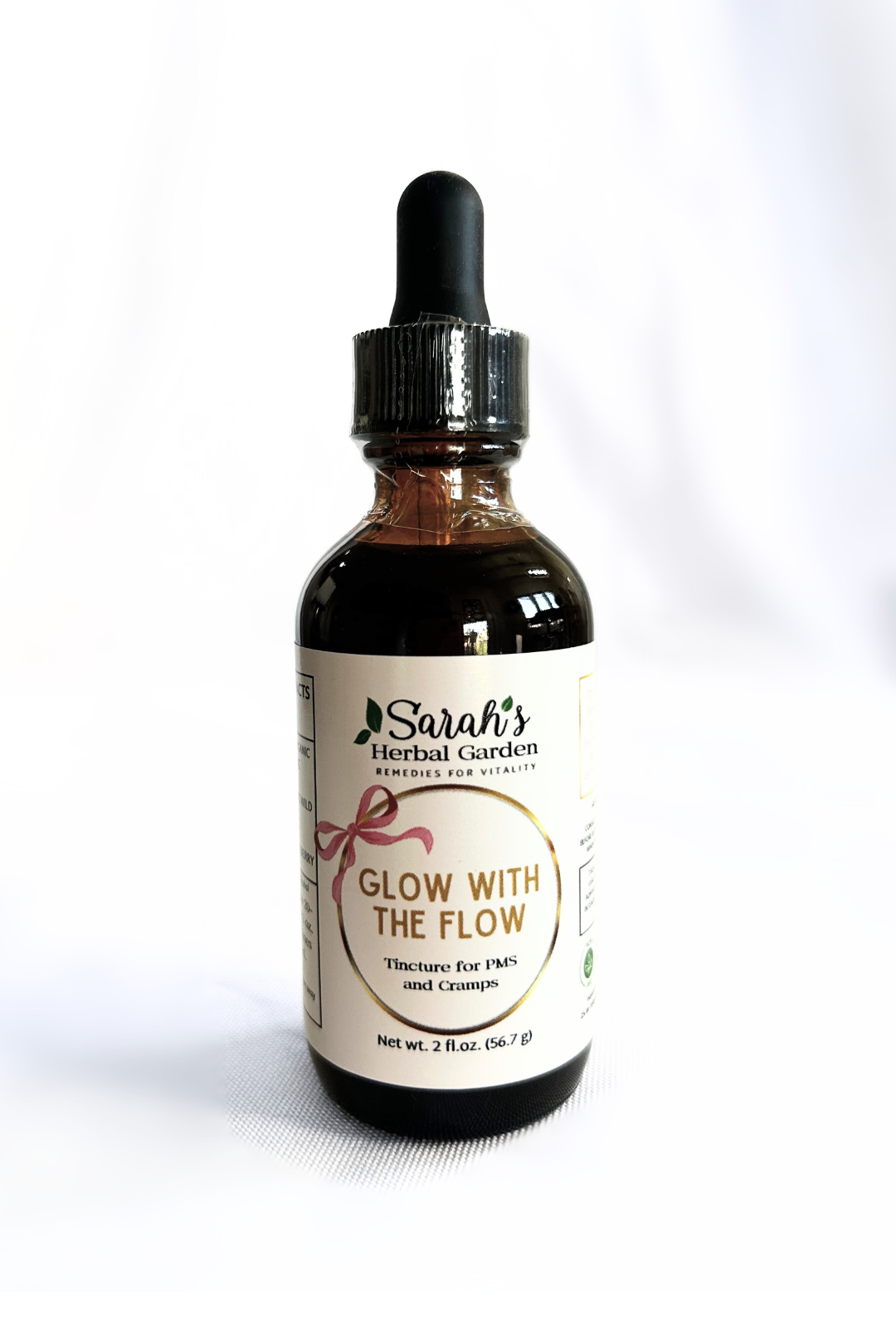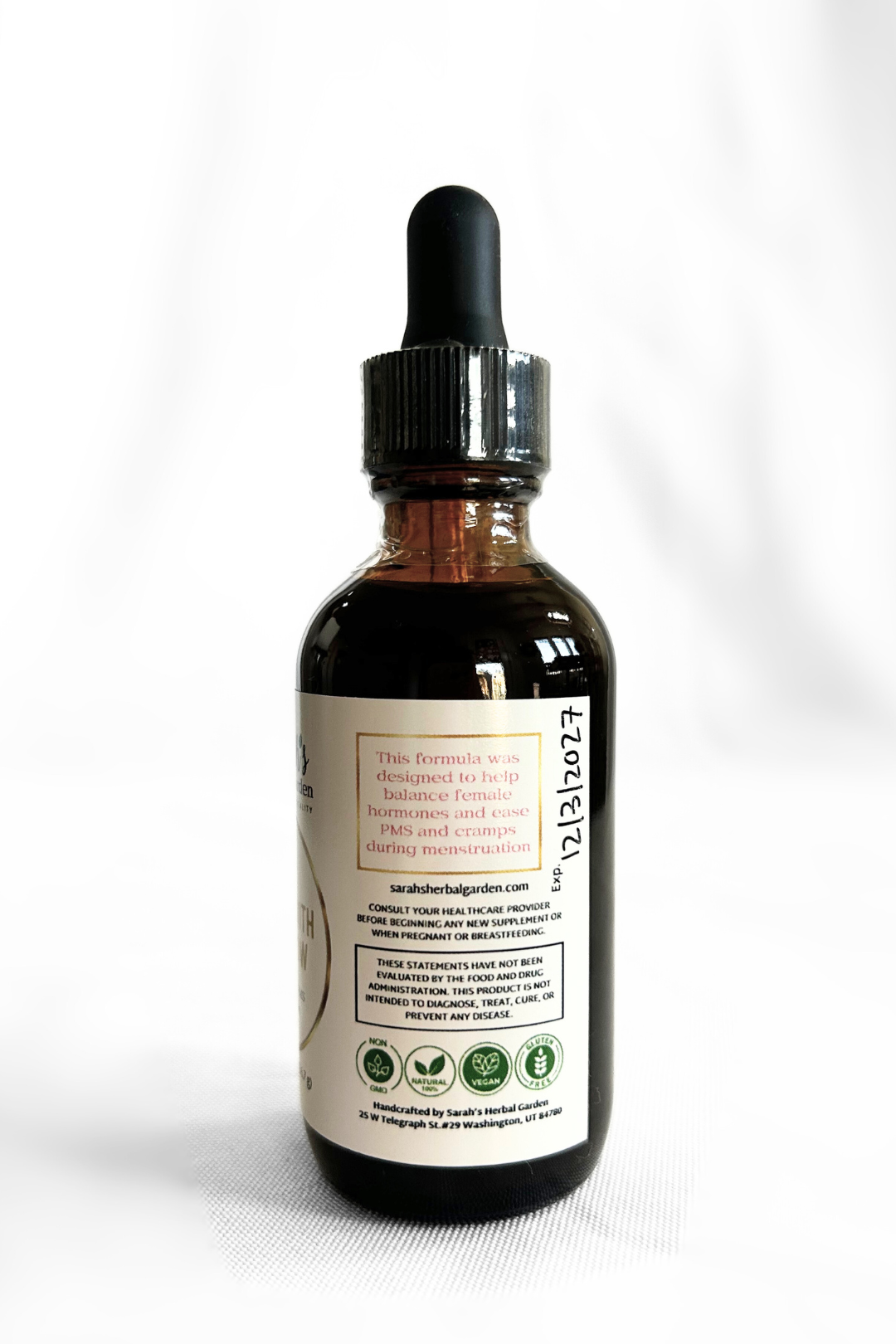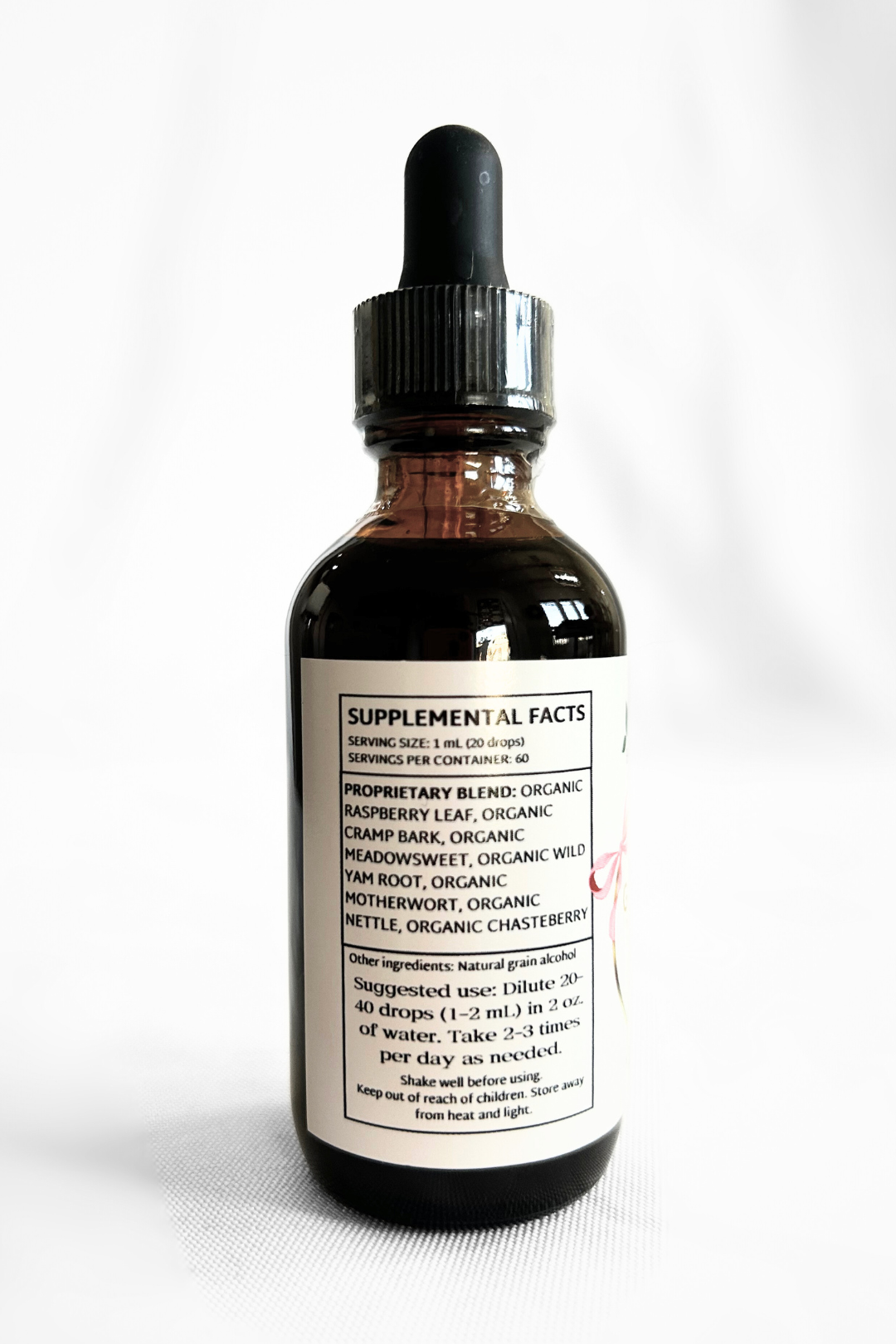Sarah's Herbal Garden
Glow with the Flow {For Menstrual Cramps}
Glow with the Flow {For Menstrual Cramps}
Couldn't load pickup availability
2 oz. Liquid Tincture
Do hormones have you on a rollercoaster? Herbs can help! This formula was chosen for properties that can help with PMS, especially severe cramps.
Herbs can help address hormonal imbalances, reduce inflammation, and provide calming or antispasmodic effects. Here's how herbs help manage PMS and cramps:
1. Balancing Hormones
Many herbs help regulate hormones like estrogen, progesterone, and prolactin, addressing the root cause of PMS symptoms.
- Chaste Berry (Vitex agnus-castus): Balances estrogen and progesterone by modulating the hypothalamus-pituitary-ovarian axis. This reduces PMS symptoms like mood swings, breast tenderness, and irregular periods.
2. Relieving Menstrual Cramps
Herbs with antispasmodic properties relax the uterine muscles, reducing cramps and tension.
- Cramp Bark (Viburnum opulus): Specifically targets uterine muscle spasms, providing quick relief from painful cramps.
- Motherwort: Relaxes smooth muscle tissue in the uterus and reduces cramping intensity.
3. Reducing Inflammation
Inflammation can exacerbate PMS symptoms, and many herbs contain anti-inflammatory compounds.
- Meadowsweet: Offers aspirin-like effects due to its salicylates, reducing inflammation and easing aches.
4. Alleviating Bloating and Water Retention
Herbs with diuretic properties help reduce bloating and water retention commonly associated with PMS.
- Nettle: Contains nutrients and diuretic properties to relieve bloating while replenishing minerals lost during menstruation.
5. Easing Breast Tenderness
Herbs that regulate prolactin or reduce inflammation can alleviate breast swelling and tenderness.
- Chaste Berry: Lowers prolactin levels, reducing breast pain.
These statements have not been evaluated by the Food and Drug Administration. This product is not intended to diagnose, treat, cure, or prevent any disease. Consult with healthcare provider if pregnant or breastfeeding, have an underlying health conditions, beginning an herbal supplement for the first time, or are taking other medications.
Share



Herbs used in this blend
Raspberry Leaf
Raspberry leaf is also rich in vitamins and minerals. It is known for helping to tone the uterus. It is often used to ease uterine spasms and PMS. It can support more regular menses and decrease heaviness of flow. It may also help to ease nausea and stomach upset.
Cramp Bark
Cramp bark (Viburnum opulus), a traditional herbal remedy, is well-known for its ability to relieve symptoms of premenstrual syndrome (PMS), particularly menstrual cramps and associated discomfort. Its antispasmodic, anti-inflammatory, and calming properties make it an effective natural solution for managing PMS. Here's how cramp bark helps:
1. Relieves Menstrual Cramps
- Antispasmodic Action: Cramp bark is rich in compounds like scopoletin and valerianic acid, which relax smooth muscle tissue. This helps reduce uterine contractions that cause painful cramps during PMS.
- Eases Uterine Tension: By reducing the tension in the uterine muscles, cramp bark alleviates discomfort associated with menstrual cramping.
2. Reduces Inflammation
- Anti-Inflammatory Properties: Cramp bark contains flavonoids and other plant compounds that reduce inflammation in the pelvic area, which contributes to menstrual pain.
- Soothes Discomfort: Its ability to reduce inflammation helps ease lower back pain and pelvic aches, common symptoms of PMS.
3. Calms Nervous System
- Mild Sedative Effect: Cramp bark has calming properties that help relax the nervous system, reducing tension and irritability often experienced during PMS.
- Eases Emotional Symptoms: By promoting relaxation, cramp bark can also alleviate mild anxiety and emotional distress associated with hormonal fluctuations.
4. Supports Healthy Blood Flow
- Relieves Congestion: Cramp bark improves circulation in the pelvic area, helping to relieve congestion that can worsen cramps.
- Prevents Clot Formation: It reduces excessive uterine contractions, which can help prevent the formation of painful blood clots.
5. Reduces Headaches and Muscle Pain
- Antispasmodic for Other Muscles: Beyond the uterus, cramp bark’s antispasmodic effects can help relieve muscle tension and headaches that often accompany PMS.
Wild Yam Root
It is believed that wild yam can actually trigger natural progesterone in a woman’s body, which supports hormonal balance related to estrogen. Wild yam can support uterine tone and ease menstrual cramping and pain. It also has a calming effect on the digestive system.
Meadowsweet
Meadowsweet (Filipendula ulmaria) is an herb with a long history of use for its soothing and anti-inflammatory properties. It is especially effective in addressing certain symptoms of premenstrual syndrome (PMS), such as pain, bloating, and irritability. Here’s how meadowsweet helps with PMS:
1. Relieves Menstrual Cramps
- Natural Pain Reliever: Meadowsweet contains salicylates, compounds similar to those found in aspirin, which help alleviate pain by reducing inflammation and inhibiting pain signals.
- Eases Uterine Discomfort: Its mild antispasmodic properties help relax smooth muscles, reducing cramping and tension in the uterus.
2. Reduces Inflammation
- Anti-Inflammatory Effects: Meadowsweet is rich in anti-inflammatory compounds such as salicylates, tannins, and flavonoids. These help reduce inflammation in the pelvic area, easing pain and discomfort.
- Alleviates Joint and Muscle Pain: Many women experience general body aches during PMS, and meadowsweet’s anti-inflammatory properties can provide relief.
3. Soothes Digestive Symptoms
- Reduces Bloating: Meadowsweet has carminative properties, meaning it helps relieve gas and bloating, which are common during PMS.
- Eases Nausea and Indigestion: Its ability to soothe the digestive tract can help alleviate nausea and other digestive disturbances associated with PMS.
4. Promotes Emotional Balance
- Calms the Nervous System: Meadowsweet has mild sedative properties that can help reduce irritability, tension, and mild anxiety, all of which are common emotional symptoms of PMS.
- Enhances Mood: By alleviating physical discomfort, meadowsweet indirectly supports a more positive mood during PMS.
5. Supports Hormonal Balance
- Gentle Hormonal Modulation: While not a direct hormone regulator, meadowsweet’s anti-inflammatory and soothing properties can help the body cope with hormonal fluctuations more effectively.
6. Acts as a Diuretic
- Reduces Water Retention: Meadowsweet’s natural diuretic properties help the body eliminate excess fluids, reducing bloating and swelling associated with PMS.
Stinging Nettle
Nettle offers nutritive support, being high in calcium, iron, phosphorous, magnesium, potassium, zinc, beta-carotene, and vitamins A, C, D, K, and B complex! This herb is often used for amenorrhea, hormone balance, libido issues, heavy menses, PMS, and osteoporosis.
Motherwort
Motherwort (Leonurus cardiaca) is a versatile herb traditionally used to support women’s health, including managing premenstrual syndrome (PMS). Its calming, antispasmodic, and hormone-balancing properties make it an effective natural remedy for alleviating both physical and emotional symptoms of PMS. Here’s how motherwort helps with PMS:
1. Relieves Menstrual Cramps
- Antispasmodic Properties: Motherwort relaxes smooth muscle tissue, including the uterus, which helps reduce the intensity of menstrual cramps.
- Eases Uterine Tension: By soothing uterine muscles, motherwort alleviates cramping and pelvic discomfort associated with PMS.
2. Balances Hormones
- Regulates Hormonal Activity: Motherwort supports overall endocrine function, helping to balance hormonal fluctuations that contribute to PMS symptoms.
- Eases Hormone-Driven Symptoms: It helps stabilize mood swings, breast tenderness, and bloating, which are often linked to hormonal imbalances.
3. Reduces Anxiety and Stress
- Calms the Nervous System: Motherwort is a mild sedative that helps reduce feelings of stress, tension, and irritability often experienced during PMS.
- Promotes Emotional Stability: By reducing cortisol levels and calming the mind, motherwort helps alleviate emotional symptoms like anxiety and mood swings.
4. Improves Circulation
- Promotes Healthy Blood Flow: Motherwort enhances circulation and relieves pelvic congestion, reducing heaviness and discomfort in the lower abdomen during PMS.
- Reduces Stagnation: Improved circulation helps alleviate pain and supports the natural flow of menstruation.
5. Eases Digestive Symptoms
- Relieves Bloating: Motherwort’s ability to relax smooth muscles extends to the digestive system, helping to reduce gas and bloating that often accompany PMS.
6. Supports Better Sleep
- Promotes Relaxation: Motherwort’s calming effects on the nervous system help improve sleep quality, which can be disrupted by PMS-related discomfort and anxiety.
- Eases Restlessness: Its sedative properties make it easier to unwind and achieve restful sleep.
7. Reduces Breast Tenderness
- Balances Hormones: Motherwort’s hormone-regulating effects help reduce swelling and tenderness in the breasts, a common PMS symptom.
- Relieves Physical Discomfort: By reducing inflammation, it alleviates physical discomfort associated with hormonal changes.
Chaste Berry
Chaste berry (Vitex agnus-castus), also known as vitex, is a well-known herbal remedy for managing premenstrual syndrome (PMS). It works by balancing hormones, alleviating both physical and emotional symptoms associated with PMS, and supporting overall menstrual health. Here's how chaste berry helps with PMS:
1. Balances Hormones
- Regulates Estrogen and Progesterone Levels: Chaste berry influences the pituitary gland to increase the production of luteinizing hormone (LH) and modulate prolactin levels. This helps balance the ratio of estrogen to progesterone, which is often disrupted during PMS.
- Reduces Estrogen Dominance: By supporting progesterone levels, chaste berry counteracts symptoms caused by high estrogen relative to progesterone, such as mood swings, bloating, and breast tenderness.
2. Relieves Breast Tenderness
- Reduces Prolactin Levels: High prolactin levels can lead to breast tenderness and swelling. Chaste berry lowers prolactin production, alleviating this common PMS symptom.
- Eases Physical Discomfort: Balanced hormone levels reduce the inflammatory response that can exacerbate breast pain.
3. Alleviates Mood Swings and Emotional Symptoms
- Stabilizes Mood: By balancing hormones, chaste berry helps reduce mood swings, irritability, and feelings of sadness or anger during PMS.
- Reduces Anxiety: Its calming effects on the nervous system may help ease anxiety and tension associated with hormonal fluctuations.
4. Eases Menstrual Cramps
- Supports Hormonal Regulation: Hormone imbalances can cause excessive uterine contractions, leading to cramps. By balancing hormones, chaste berry may reduce the severity of menstrual cramps.
- Relieves Pelvic Discomfort: Its overall hormone-stabilizing effects help alleviate tension and pain in the pelvic area.
5. Reduces Bloating and Water Retention
- Balances Hormonal Activity: Hormonal shifts during the luteal phase can lead to bloating and water retention. Chaste berry helps regulate these hormones, reducing bloating.
- Eases Digestive Discomfort: By addressing underlying hormonal causes, chaste berry can help minimize PMS-related gastrointestinal symptoms.
6. Regulates Menstrual Cycles
- Promotes Cycle Regularity: For women with irregular periods or unpredictable PMS symptoms, chaste berry supports a more consistent menstrual cycle by regulating hormonal activity.
- Eases Transition to Menstruation: A balanced hormonal environment helps reduce the intensity of PMS symptoms leading up to the menstrual phase.



